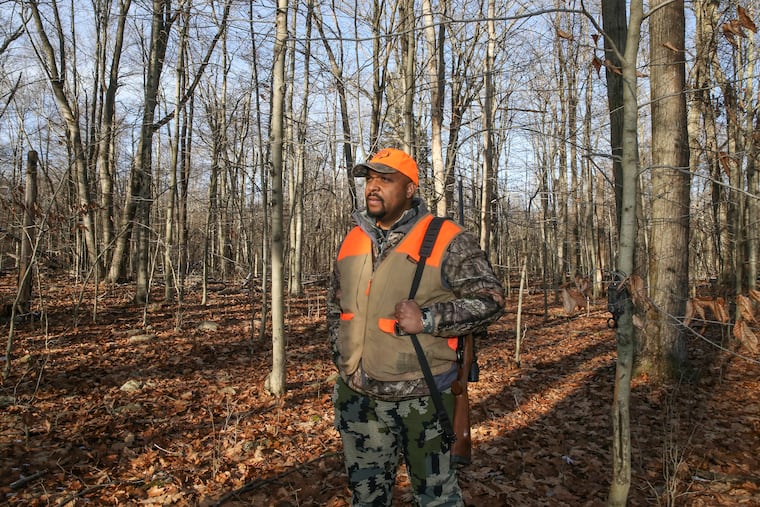A Black-owned camp in the Poconos aims to make hunting more diverse
Hunting groups nationwide have lamented the slow, steady decline in registered hunters over the last decade, so getting any new hunters into the fold is critical.

POCONO SUMMIT, Pa. — If Warren Gamaliel Harding Brown could see the hunting camp his grandson has crafted in the Poconos, he’d admire the large stone fireplace, the taxidermied deer head, and the turkey feathers on display beside some spent shotgun shells.
The flat-screen television mounted on the wall might have surprised the late patriarch, but the spirit of the place would have pleased the man who taught older family members to hunt and inspired the younger ones, decades ago, in rural Virginia.
That’s why Jonathan Wright named the the place “Pocono Browns.”
“He’s the one who started it all, this deep connection to the woods,” Wright, dressed in camouflage and safety orange, said at the camp on a recent weekday.
Wright, 34, doesn’t promote Pocono Browns, which he bought in April, as a Black-owned hunting camp, but it’s fair to say there aren’t many in the Northeast. Most hunters who rent his place are white, he said, but Black hunters, particularly newer ones, have sought him out.
“I had a guy drive here all the way from Columbus, Ohio, to hunt here because he was a Black hunter who was new to hunting and he wanted that level of comfort,” Wright said. “One of my passions is to get more Blacks into hunting.”
Hunting groups nationwide have lamented the slow, steady decline of registered hunters over the last decade, so getting any new hunters into the fold is critical. Portions of hunting license fees contribute to conservation efforts nationwide and also help fund the state agencies that regulate hunting.
Pennsylvania has seen fluctuations in hunting numbers dating back to 2009, when 941,970 adults and children purchased licenses. By 2019, the total had slid to 860,743. The numbers of licenses sold did rise slightly in 2020, likely due to a coronavirus pandemic bump that sent the nation clamoring for outdoor activities.
The Pennsylvania Game Commission doesn’t track hunting license sales by race, but the agency has found some success promoting the sport in parts of the state where hunting isn’t as ingrained, like Philadelphia. Mentored hunts at John Heinz National Wildlife Refuge at Tinicum have taught many young hunters in the city and surrounding areas how to take a whitetail deer with a crossbow, said Lamar Gore, the refuge manager.
“We had community meetings about it and, initially, people were resistant,” Gore said. “We had to change what they thought of as hunting.”
Gore, 49, grew up in Trenton and found his own way into the outdoors, much to the worry of his parents.
“There was a concern that I would cross ways with the wrong white person out there,” he said.
John Annoni, an Allentown School District teacher who is biracial, found a love for the outdoors much the same way Gore did. He was a self-starter. Annoni wrote a memoir, From the Hood to the Woods, and in 1994, he started Camp Compass Academy, a nonprofit that aims to introduce kids from urban areas and with diverse backgrounds to hunting.
“My father died of a heroin overdose and I would have to go to my biological mom’s on weekends. There was an adjacent wood lot. I spent a lot of time out there chasing rats and squirrels and starlings,” said Annoni, who grew up in Allentown. “It was a process through the pain for me. And I found out that Mother Nature loved me.”
Wright, an attorney who lives in Morris County, N.J., with his wife and three children, said he went hunting with family on his grandfather’s property in rural Buckingham County, Va., about 75 miles west of Richmond, where he grew up. Wright commends every hunter who found a love for the sport on his or her own, but he knows having an adult male figure or a group of them, like his grandfather, cousin, and uncles, can cement the bond.
“I want people of all backgrounds to come here, but an interest is to get more Black hunters to come here, particularly young kids and their dads,” Wright said. “It’s a form of wellness, and peace, sitting in the woods like that. Whatever has kept minorities away from that needs to change.”
Eric Morris, a Georgia-based hunter and guide with his own show on Pursuit Channel, said Black hunters have been active for centuries, the familial bonds to the hobby like Wright’s more common in the South than the Northeast. Morris, who is Black, believes one reason more diverse groups aren’t engaging in hunting is a longtime lack of representation in outdoors television programs and magazines.
“When you watched a hunting or fishing show, it was mostly older white men from the South,” he said. “It’s rare you’d see a nonwhite person.”
Morris said the television landscape isn’t changing. Even with his own show, he said, finding sponsorship is difficult.
Gore, 49, of the Heinz Refuge, believes hunting has a marketing problem.
“We have groups that are lamenting the decline of hunting and the remedy is to continuously reach out to the people who are already hunting,” Gore said. “I’m not saying all of it is an intentional, exclusionary tack, but I think there’s people out there who are definitely trying to keep folks out. "
Wright hopes his camp, which sleeps six, will be the first of many. He hopes to open others in Michigan, where he went to college, and Virginia.
“I feel at home having a deer camp,” he said. “It’s an anchor. I think other people will feel that, too.”